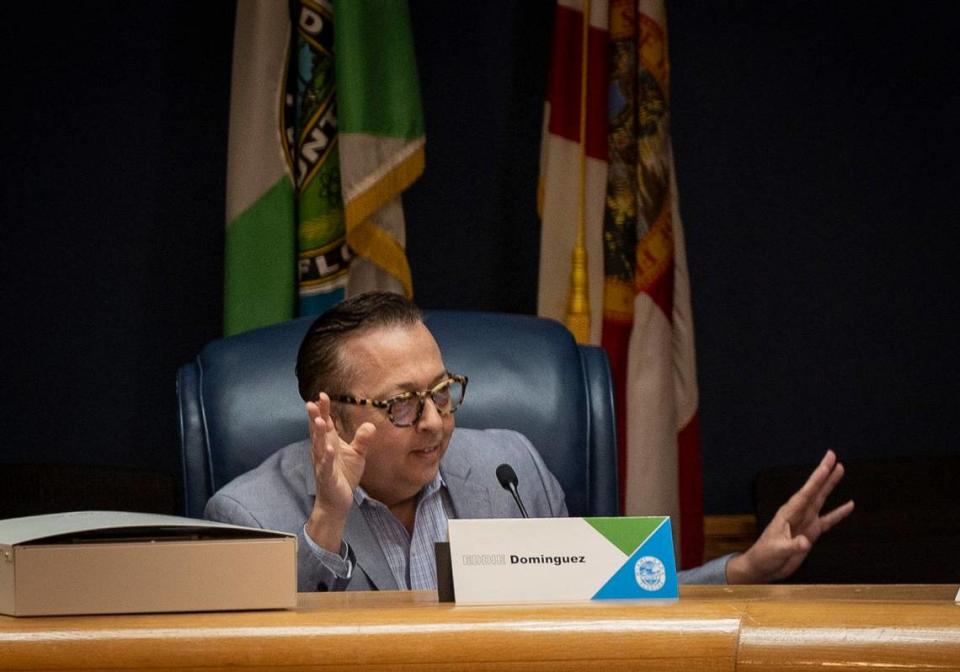Unless it makes itself indispensable — fast — Miami-Dade’s police review panel may not survive | Opinion
It’s hard to fathom that more than three years have passed since the re-establishment of the Miami-Dade Independent Civilian Panel, a hard-won victory for the community to reintroduce civilian oversight over the county police department — a direct response to the tragic murder of George Floyd by Minneapolis police in 2020.
Back then, it was a battle royale at commission meetings to get the item passed as Black Lives Matter demonstrators demanded police accountability everywhere.
Today, regrettably, the ICP remains largely obscure, struggling to be relevant. Members, each appointed by one of the 13 commissioners, barely manage to reach a quorum at monthly meetings. In its current state, the panel lacks authority and influence.
Panel gets a D+
Throughout its existence, the panel has reviewed only a small number of complaints against police for practice, while facing significant operational challenges. Its most notable shortcoming: Few in the community know the ICP even exists. Unfortunately, at this point, there is no other appropriate grade for the panel than to give it a D+. That’s a shame.
The panel’s failure is a disservice to the Miami-Dade residents whose tax money is financing it. Its role was simple, but important: “Be an impartial entity created to conduct independent investigations and review and hold public hearings regarding grievances made against sworn officers related to brutality, excessive force and unbecoming conduct.
Since its adoption by the County Commission, after surviving a veto from then-Mayor Carlos Gimenez, this Editorial Board monitored the panel’s progress, as it appeared to be a much-needed addition to the community. We were present at the ICP’s inaugural meeting.
However, instead of chronicling the handling of police brutality cases, we found ourselves documenting the numerous obstacles and missteps the ICP encountered as it took its first steps, from an initial overabundance of attorneys on the panel to prolonged members training on how to function as a police oversight board, as well as the lack of an executive director and suitable office space. Nonetheless, they did manage to take several trips across the country to training sessions.
Should ICP be disbanded?
We don’t want to bash the panel members. It’s not all their fault and they have stuck it out. Eddie Dominguez has been a prominent figure expressing frustration over the slow pace of nearly every task undertaken by the panel, and chairwoman Loreal Arscott has shown unwavering commitment to keep moving ahead. Vice Chair Pam Perry has also been a spark plug on the panel.
Nonetheless, Editorial Board once contemplated the possibility of recommending the disbandment of the ICP and reallocating its up to $1 million budget elsewhere. We hesitated, mindful of the potential waste of time and energy, particularly for community activists who fought vigorously to resurrect the original panel disbanded years ago.
Now, as revealed in an article by Miami Herald Reporter Charles Rabin recently, the ICP finds itself at an existential crossroads. Its latest setback is the apparent withdrawal of former Miami-Dade Police Director Freddy Ramirez from the 2024 county sheriff’s race. Ramirez, an ally of Miami-Dade Mayor Daniella Levine Cava, had been presumed the winner who would likely keep the ICP in place.
However, Ramirez tragically shot himself in the head in July during a domestic dispute. He survived, but has withdrawn from the sheriff’s race, which spells trouble for the panel, which the sheriff has the authority to disband.
Sheriff’s race
Given this situation, can the panel survive?
Even Levine Cava recognizes the ICP’s precarious position once a possibly more-conservative sheriff assumes the role of the county’s chief of public safety. When the Editorial Board asked about her hopes for the panel, the mayor indicated she hoped for its survival but acknowledged the challenges it faces.
The ICP’s new director, Ursula Price, responded to a request for comment with a long list of ICP’s future plans. Let’s hope they can become a reality.
The only viable future we see for the ICP is a window of opportunity in the coming months during which the panel must demonstrate its significance and become a prominent player in the law enforcement arena.
By doing so, its very need for existence in the community can maybe emerge as a pivotal campaign issue in the sheriff’s race.
Miami-Dade Commissioner Raquel Regalado, who has observed the panel’s fading prospects with concern, shares this view.
“The ICP will have to move mountains, but the only way I see the panel surviving under a sheriff is if the panel makes itself indispensable to residents and becomes a campaign topic,” said Regalado.
The ICP has a challenging road ahead.
Regrettably, if the ICP does not rise to the occasion and become a significant player — immediately — we might as well start writing its obituary.


